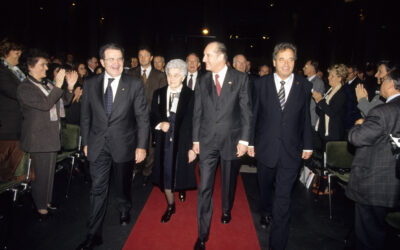 ‘We want to share with you our joy at how the recent referendum turned out,’ write Anča and Vine Povirk from Domzale in Slovenia, members of the Focolare’s New Families Movement. ‘It was the result of a great deal of cooperation between various civil and religious movements, and numerous families, all united in a peaceful battle in favour of the family.’ The vast majority of the media and of influential politicians were in favour of the new law that sought, among other things, greater liberalization for same sex couples – for example, with regard to third-party adoptions, by allowing a same sex couple to adopt the biological child of one of the partners, as well as a whole raft of measures regarding unmarried couples. The ‘yes’ campaign had huge financial resources (more than 2 million euros), while the ‘no’ campaign was entirely self-supporting. It was in no sense an equal battle. The initiative, promoted at first only by Catholics, soon drew in other Christians, members of other religions and many who, without professing any specific faith, uphold human values. Together they managed to collect the 40,000 signatures necessary to call for a referendum. It was held on 25 March with a turnout of 30% and, contrary to expectations, the ‘no’ vote was 55%. ‘For two and a half years we worked beyond our capabilities and our strength to defend basic family values,’ Marjana and Pavel from Ljubljana – Delegates of the New Humanity Movement in Slovenia – tell us. ‘We spoke in Parliament, held public events before the vote, organized a Family Day, collected signatures… we wrote to MPs, to the Constitutional Court, speaking many, many times on discussion programmes on television, national and local radio… and in this way we built up numerous friendships with the members of other ecclesial movements, with important people in the sphere of civil life and politicians of various parties… Now, however, we are beginning the most important phase: working to give our contribution to a new law for family life framed around the values we strongly believe to be basic to society and which have their roots in the Gospel.’ A comment put out by Mgr Anton Stres, the Metropolitan Archbishop of Ljubljana and president of the Slovenian Episcopal Conference, thanked ‘all those who were committed to achieve this aim and to make the electorate aware of the irreplaceable role of the family in our life.’ Nonetheless, the comment continues, ‘with the outcome of the referendum, family values are not assured; indeed, it is necessary to live them every day in our relationships with one another.’
‘We want to share with you our joy at how the recent referendum turned out,’ write Anča and Vine Povirk from Domzale in Slovenia, members of the Focolare’s New Families Movement. ‘It was the result of a great deal of cooperation between various civil and religious movements, and numerous families, all united in a peaceful battle in favour of the family.’ The vast majority of the media and of influential politicians were in favour of the new law that sought, among other things, greater liberalization for same sex couples – for example, with regard to third-party adoptions, by allowing a same sex couple to adopt the biological child of one of the partners, as well as a whole raft of measures regarding unmarried couples. The ‘yes’ campaign had huge financial resources (more than 2 million euros), while the ‘no’ campaign was entirely self-supporting. It was in no sense an equal battle. The initiative, promoted at first only by Catholics, soon drew in other Christians, members of other religions and many who, without professing any specific faith, uphold human values. Together they managed to collect the 40,000 signatures necessary to call for a referendum. It was held on 25 March with a turnout of 30% and, contrary to expectations, the ‘no’ vote was 55%. ‘For two and a half years we worked beyond our capabilities and our strength to defend basic family values,’ Marjana and Pavel from Ljubljana – Delegates of the New Humanity Movement in Slovenia – tell us. ‘We spoke in Parliament, held public events before the vote, organized a Family Day, collected signatures… we wrote to MPs, to the Constitutional Court, speaking many, many times on discussion programmes on television, national and local radio… and in this way we built up numerous friendships with the members of other ecclesial movements, with important people in the sphere of civil life and politicians of various parties… Now, however, we are beginning the most important phase: working to give our contribution to a new law for family life framed around the values we strongly believe to be basic to society and which have their roots in the Gospel.’ A comment put out by Mgr Anton Stres, the Metropolitan Archbishop of Ljubljana and president of the Slovenian Episcopal Conference, thanked ‘all those who were committed to achieve this aim and to make the electorate aware of the irreplaceable role of the family in our life.’ Nonetheless, the comment continues, ‘with the outcome of the referendum, family values are not assured; indeed, it is necessary to live them every day in our relationships with one another.’
Here I am!
Here I am!




0 Comments